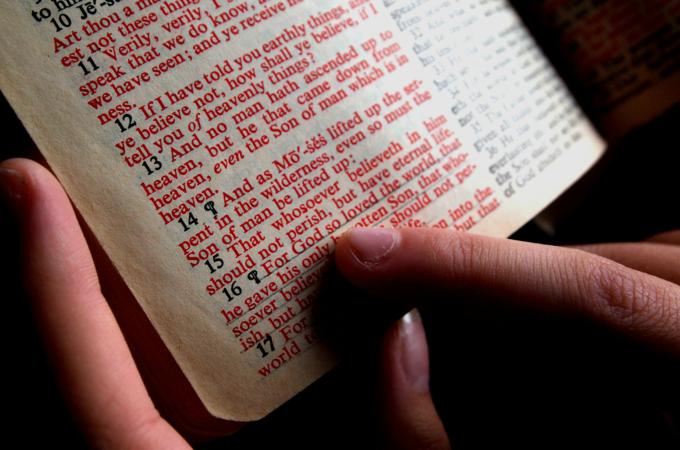Our amazing Bible study
It's not that we knew nothing of the Bible. After all, for years we have been reading and hearing Old and New Testament Scripture at Mass. But our knowledge and understanding has been thin.
Our Evangelical friends quote Samuel or Job so easily. We, on the other hand, have memories of coloring pictures of Jesus, and reading condensed stories of high point events of the Old Testament: Moses parting the Red Sea and coming down from the mountain, smashing the tablets in disgust with his followers. In retrospect, our ignorance is embarrassing.
To the rescue came Dr. Scott Abercrombie, an elderly deacon in our parish, who was frankly appalled at our lack of biblical knowledge. He was our own Walker Percy. A doctor, a Southerner and a convert, Deacon Abercrombie even resembled Percy. He started our Bible study eight years ago. Before he died, the deacon anointed our current leader, another doctor, Ronni Devon.
Our 10-member Bible study group meets after Sunday Mass every two weeks. We take turns with presentations so that each person has responsibility to study and write a summary of the assigned chapters. We are sometimes full of wonder at how the stories were recorded and how they survived.
We decided to read the entire Bible. We have been working our way through the Old Testament, studying in Kings 1 and 2 the travails of the Jews from their leaving the captivity in Egypt to their captivity by the Babylonians. It's not a pretty picture, with endless fighting among the 12 tribes, as well as raiders from neighboring tribes. There was so much blood that the Holy Land must have been drenched in blood for centuries. What is shocking is the level of killing: 20,000 here, another 10,000 there!
The Jews were ruled by kings, most of whom were continually straying from Moses' Ten Commandments and leading their people into worshiping golden idols and false gods of fertility and plentiful harvests. Or they lied and cheated and slew their competition. The worst story (so far) is the mothers' exchange plan during a famine. "We will eat your baby today and mine tomorrow," the bargain goes. But the first mother reneges on the agreement when it comes time to eat her child. Tough stuff!
How hard the Jews of the Old Testament must have worked, procuring food, keeping their sheep from straying and their tents repaired. They had to weave garments (so they could rent them from time to time), collect the seed crop, gather water, and sharpen their spears. It seems as if only the kings had excess time and energy for play and procreation, as with King David playing his harp, composing psalms and spying on Bathsheba at her bath.
Famines, devastation, droughts were overwhelming. If we walk in their sandals, can we imagine what we would do? If you believed the gods of harvest and fertility had to be appeased or people would be barren or perish, perhaps you can see how the simple Old Testament creature returns to the sacrifice to gods of nature, and turns against the word of the One God.
Occasionally we are amazed that the foreshadowing of events we know from the New Testament had an original event in the Old Testament. A rising from the dead or miraculous recovery of eye sight occurs earlier in the narrative of the Old Testament. In our little group, we pour over maps and timelines to keep track of where tribes moved and fought. We are trying to keep straight the northern and southern kingdoms and the shifting borders. For those who have visited the Holy Land, studying the Bible has enriched both experiences.
But the Bible is our story of creation and the foundation for much of what we understand in our liturgy today. At one time, the Bible was studied as literature at universities, but that was awhile back. Scholars suggest that the reasons why we Catholics have such slight knowledge of the Bible, compared with Protestants, is that since they broke away from the authority of Rome, they sought in the Holy Scriptures the authority by which to lead their lives. Individual interpretation of the Bible became not only a hallmark of Protestantism, but the reason for so many different Protestant religions.
The reasons for the revival of Bible study among Catholics are many, from Pope Pius XII's 1943 encyclical, "Divino Afflante Spirito" ("Inspired by the Holy Spirit") to the stress put on biblical scholarship by the Second Vatican Council. One commentator credits Catholic embarrassment at sporting events, not knowing to what those signs "John 3:16" referred. ("For God so loved the world that he gave his only Son, so that everyone who believes in him might not perish but might have eternal life.") We among them!
From our studies, we are reminded that like sheep that have gone astray, we have turned everyone to his own way. Our founder, Deacon Abercrombie once claimed that we, too, are a stiff-necked people. If nothing else, we now have some notion of how we came to be that way.
- Kevin and Marilyn Ryan, editors of "Why I'm Still a Catholic," worship at St. Lawrence Church in Brookline, Mass.



















